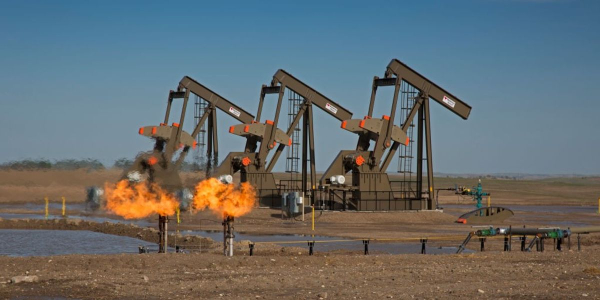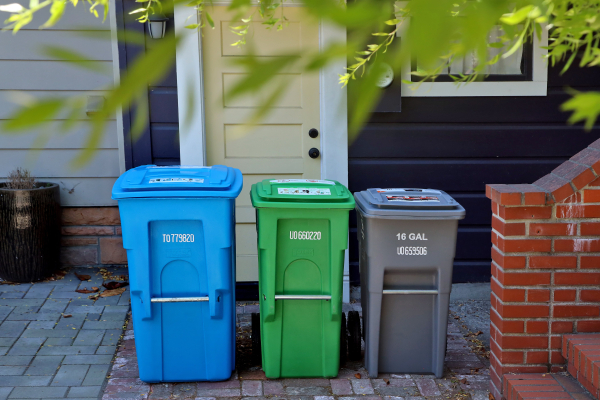Suche
Beiträge, die mit methane getaggt sind
"It's a sorry testament to the influence of Big Oil on Capitol Hill that one of the top priorities of Congress is a blatant handout to the worst actors in the #FossilFuel industry," said one critic.
Jessica Corbett, Feb 28, 2025
"Climate advocates are blasting congressional Republicans this week for their latest gift to fossil fuel industry: sending a resolution to kill the federal Methane Emissions Reduction Program to the desk of U.S. President Donald #Trump.
"#BigOil - backed Trump is expected to sign the Congressional Review Act resolution, which senators passed along party lines on Thursday. That followed a Wednesday vote in the House of Representatives, where Democratic Reps. Henry Cuellar (Texas), Jared Golden (Maine), Vincente Gonzalez (Texas), Adam Gray (Calif.), Kristen Donald Rivet (Mich.), and Marie Gluesenkamp Perez (Wash.) supported the measure alongside all Republicans present except Rep. Brian Fitzpatrick of Pennsylvania.
"#Methane has more than 80 times as much warming power as carbon dioxide during its first two decades in the atmosphere. The pollution program was established by the 2022 Inflation Reduction Act and finalized by the Environmental Protection Agency (EPA) last November. The Associated Press reported Thursday that 'most major oil and gas companies do not release enough methane to trigger the fee, which is $900 per ton, an amount that would increase to $1,500 by 2026.'
"The GOP resolution will end the program, but not the mandate from the 2022 law. #MahyarSorour, #SierraClub's director of beyond fossil fuels policy, declared that 'this attack on EPA's implementation of the methane waste emissions charge is short-sighted and harmful. It remains a legal requirement for EPA to hold the biggest methane #polluters #accountable for their negligence.'
"'Forcing the agency to implement the charge some other way after conducting a thorough, well-researched process is as wasteful of taxpayer resources as these oil and gas operators are wasteful of harmful methane,' Sorour argued.
"'Technology to monitor and stop leaks is readily available and easy to implement, so only wasteful, careless corporations will face a fee for excessive methane pollution. Despite this setback, Sierra Club will not stop fighting to make polluters pay for their egregious actions.'"
https://www.commondreams.org/news/methane-fee
#BigOilAndGas #USPol #ClimateCatastrophe #MakePollutersPay

'When Big Oil Says Jump, Republicans Ask How High?' GOP Sends Climate-Killing Bill to Trump's Desk
"It's a sorry testament to the influence of Big Oil on Capitol Hill that one of the top priorities of Congress is a blatant handout to the worst actors in the fossil fuel industry," said one critic.jessica-corbett (Common Dreams)
It means less methane from landfills.
Methane is a really potent greenhouse gas.
Landfills are a major source of it.
I've composted for years. It's easy - stuff rots. The nuances come in if you want fast good compost for #gardening, but to just lessen trash, it's very simple.
My rules... (cont)
#compost #methane #climatechange
#garbage #landfill
https://www.canarymedia.com/articles/methane/new-york-city-now-mandates-composting-next-comes-the-hard-part

New York City now mandates composting. Next comes the hard part.
Municipal composting programs like NYC’s aim to reduce methane emissions from landfills, but implementing them effectively is a long process. Just ask…Canary Media
Drastic shift driven by frequent #wildfires, pushing surface air #temperatures to second-warmest on record since 1900
by Dharna Noor, Tue 10 December
"The Arctic tundra is undergoing a dramatic transformation, driven by frequent wildfires that are turning it into a net source of carbon dioxide emissions after millennia of acting as a carbon sink, the US National Oceanic and Atmospheric Administration (#Noaa) said on Tuesday.
"This drastic shift is detailed in Noaa’s 2024 Arctic Report Card, which revealed that annual surface air temperatures in the Arctic this year were the second-warmest on record since 1900.
“'Our observations now show that the Arctic tundra, which is experiencing warming and increased wildfire, is now emitting more carbon than it stores, which will worsen climate change impacts,' said Rick Spinrad, a Noaa administrator.
"The report, led by scientists from the Woodwell Climate Research Center in Falmouth, Massachusetts, found that the Arctic is warming faster than the global average for the 11th year in a row.
"Currently, it is warming at up to four times the global rate, the authors found.
"Climate warming has dual effects on the Arctic. While it stimulates plant productivity and growth, which remove carbon dioxide from the atmosphere, it also leads to increased surface air temperatures that cause permafrost to thaw.
"When permafrost thaws, carbon trapped in the frozen soil is decomposed by microbes and released into the atmosphere as carbon dioxide and methane, two potent greenhouse gases.
"'We need accurate, holistic and comprehensive knowledge of how climate changes will affect the amount of carbon the Arctic is taking up and storing, and how much it’s releasing back into the atmosphere, in order to effectively address this crisis,' said Dr Sue Natali, a scientist at the Woodwell Center who contributed to the research. 'This report represents a critical step toward quantifying these emissions at scale.'
"Human-caused climate change is also intensifying high-latitude wildfires, which have increased in burned area, intensity and associated carbon emissions.
"Wildfires not only combust vegetation and soil organic matter, releasing carbon into the atmosphere, but they also strip away insulating soil layers, accelerating long-term permafrost thaw and its associated carbon emissions.
"'In recent years, we’ve seen how increasing fire activity from climate change threatens both communities and the carbon stored in permafrost, but now we’re beginning to be able to measure the cumulative impact to the atmosphere, and it’s significant,' said Dr Brendan Rogers, Woodwell Climate scientist and report contributor."
https://www.theguardian.com/world/2024/dec/10/arctic-tundra-carbon-shift?utm_source=firefox-newtab-en-us
#GlobalWarming #GlobalBurning #2024ArcticReportCard #ArcticWarming #Tundra #PermafrostThaw #GreenhouseGases #Methane #Microbes #ClimateCrisis #ClimateChange
#climatechange #methane #globalheating
By Angela Dewan, CNN
Published February 13, 2024
"Warmer air temperatures have driven #IceLoss, which has in turn raised land temperatures. That has caused the melting of #permafrost, a frozen layer just beneath the Earth’s surface and found in much of the #Arctic, and that melt releases planet-warming #CarbonDioxide and #methane, contributing to more #GlobalWarming. #PermafrostMelt is also causing #LandInstability, which could impact infrastructure and buildings.
"'We have seen signs that the loss of ice is triggering other reactions which will result in further loss of ice and further ‘greening’ of Greenland, where shrinking ice exposes bare rock that is then colonized by tundra and eventually shrub,' one of the report’s authors, Jonathan Carrivick, said in a press release. 'At the same time, water released from the melting ice is moving sediment and silt, and that eventually forms wetlands and fenlands.'
"The loss of ice is creating what’s known as a #FeedbackLoop. Snow and ice typically reflect the sun’s energy back into space, preventing excessive heating in parts of the Earth. But as ice disappears, those areas absorb more solar energy, raising land surface temperatures, which can cause further melt and other negative impacts.
"#IceMelt also increases the amount of water in lakes, where water absorbs more heat than snow, which increases land surface temperatures.
"Greenland has been warming at twice the global mean rate since the 1970s, and the study’s authors warn that more extreme temperatures in the future are likely.
"Greenland is the world’s biggest island and is mostly covered by ice and #glaciers. Around 57,000 people live in the country, which is an autonomous country within the Kingdom of Denmark. Much of the population is #indigenous and many people there rely on natural #ecosystems for their survival.
"Michael Grimes, the report’s lead author, said that the flow of sediments and nutrients into coastal waters was particularly problematic for #IndigenousCommunities that rely on fishing, as well as for hunters on other parts of the island.
"'These changes are critical, particularly for the indigenous populations whose traditional subsistence hunting practices rely on the stability of these delicate #ecosystems,' he said.
"'Moreover, the loss of ice mass in Greenland is a substantial contributor to #GlobalSeaLevelRise, a trend that poses significant challenges both now and in the future.'"
https://www.cnn.com/2024/02/13/climate/greenland-ice-loss-vegetation-climate-intl/index.html
